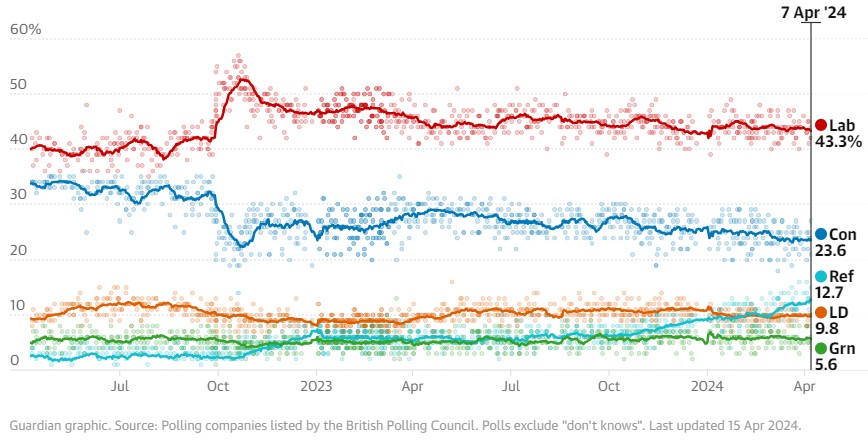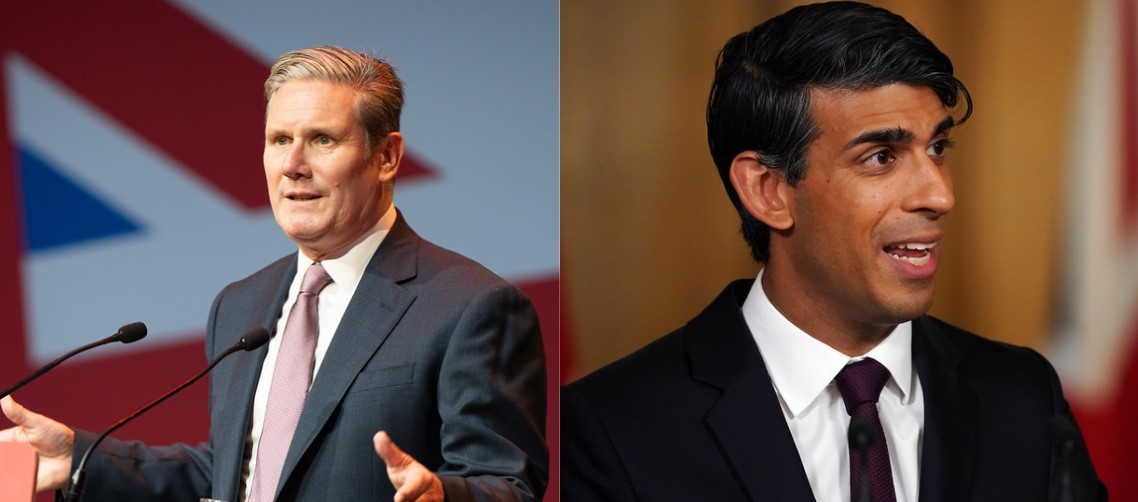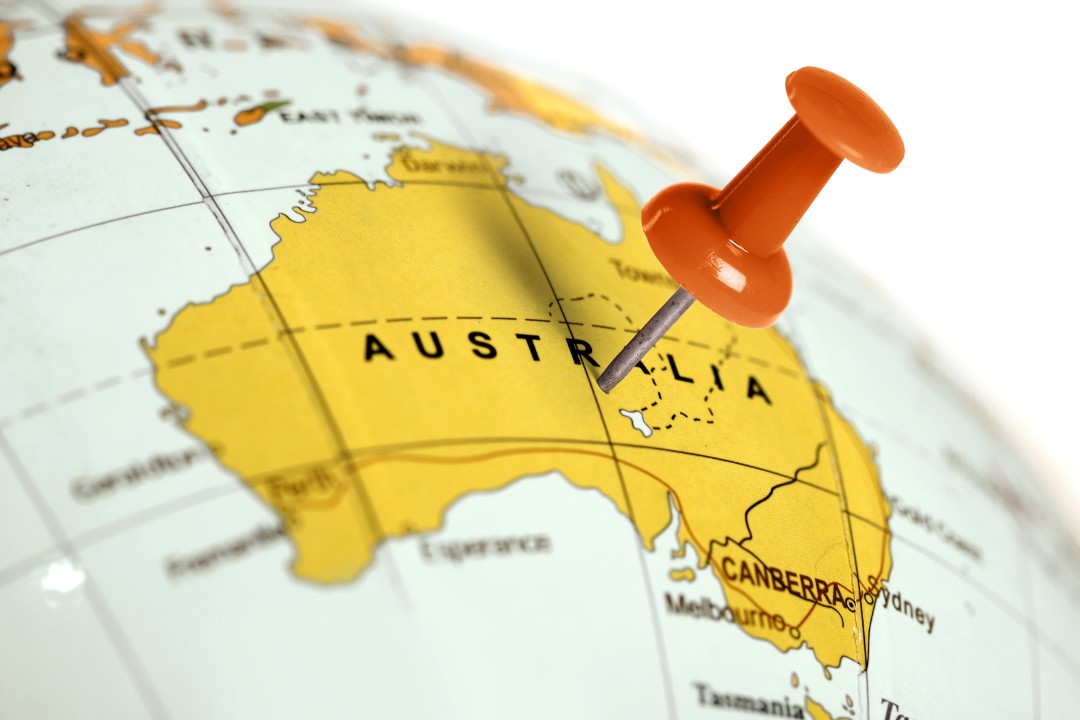In the lead up to the next United Kingdom general election, widely anticipated to be called later this year, key players are gearing up to commence their campaigns – with cost-of-living, geopolitics, and immigration dominating the battlegrounds.
After 13 years of Conservative Party rule, the Labour Party, led by Sir Keir Starmer, is hoping to come out on top. Polling since the start of 2022 has demonstrated that Labour has been consistently ahead of the Conservative Party, led by Prime Minister Rishi Sunak, meaning that the general election may represent a ‘turning point’ in British politics.
In this Insights article, we explore the context, key players, and issues which are shaping the agenda for the next UK general election.
Government: Conservatives
Background
The Conservative Party, commonly known as the Tories, is the current governing party in the UK and has maintained this position since 2010. Ideologically, the Conservatives are right-wing to centre-right, encompassing factions such as One-Nation conservatives and Thatcherites.
The Conservative party is centered upon conservatism, emphasising traditional values, strong national defence, and free-market economics. The party championed the UK’s exit from the European Union, or Brexit.
The voting and financial support base for the party has historically consisted of homeowners, business owners, and middle-class voters particularly in rural and suburban England. In recent years, the Conservative party has enjoyed support from traditionally-Labour held seats as the working class greatly supported the Brexit decision.
Over the past 13 years, there have been five Conservative Prime Ministers: David Cameron, Theresa May, Boris Johnson, Liz Truss, and Rishi Sunak. For both Cameron and May, the challenges around managing Brexit led to their resignation. Johnson resigned following the COVID-19 pandemic ‘lockdown party’ scandals.
While Liz Truss was leading Government, the Conservatives saw a sharp decline in public support while by comparison, the Labour Party enjoyed a rapid increase in support. The changes in public sentiment towards the major parties followed Truss’ ‘mini-budget’ which included plans for tax cuts without equivalent spending cuts. This destabilised the market and was responsible, in part, for a fall in the value of the pound and an increase in borrowing costs.
Current standing
Prime Minister Rishi Sunak was appointed to the role in October 2022, in context of faltering public opinion on the Conservative Party and increased support for the Labour Party.
Recent polling has shown that public support for the Conservatives has fallen to 24%, which is the lowest figure seen for the party since Rishi Sunak replaced Liz Truss as Prime Minister.

Image source: The Guardian UK
Rishi Sunak is challenged on multiple fronts, with members of his party feeling disgruntled over the Conservative Party’s state of play. Over recent weeks, Sunak has faced substantial public and party criticism over his handling of a range of issues, including resignations of a range of MPs and comments made by Frank Hester, a large donor to the party.
The Sunak Government’s budget, released earlier in March, did little to affect public opinion of the party, to the disappointment of many of its members. Despite some cost-of-living relief measures including personal tax cuts, the budget did not go far enough to transform the Conservatives standing with the public continuing to attribute the current economic hardships to the party’s legacy.
Opposition: Labour Party
Background
Alongside the Conservative Party, the Labour Party is the second major political party in the UK. It historically represents the interests of the working-class, with a core ideology focused on social democracy, workers’ rights, fair wealth distribution and advocating for social justice. Notably, the Labour Party was responsible for creating the National Health Service (NHS) while in majority government in 1945.
Current standing
The party’s current leader is Sir Keir Starmer, who has led the party since 2020. His focus is on uniting the party, appealing to a broad range of voters, and holding the Conservative government accountable. Since Liz Truss’ mini-budget, Labour has consistently held a 20-point lead in public opinion polling.
Starmer’s leadership has been characterised by his movement towards the political centre of the Labour Party and abandonment of the left-wing platform of his leadership campaign. He is also known for his opposition towards the Conservative Party’s response to the COVID-19 pandemic and Johnson parties, the Truss mini-budget, and the current cost of living crisis.
Minor parties
Aside from the major parties, the Liberal Democrats, Scottish National Party, Green Party and Reform UK are minor parties with considerable support and representation in the House of Commons. Their priorities are listed below:
- The Liberal Democrats: Liberalism, individual freedom, and the free market. Their most notable policy in recent years was opposing Brexit.
- Scottish National Party: Advocates for Scottish independence and highly critical of the Conservative government.
- Green Party: Tackling the climate crisis and net-zero by 2030, as well as re-entering the EU, taxing the wealthier echelons of society and investing in new ‘green’ technology.
- Reform UK: Formerly called the Brexit party, prioritises reforming the UK socially and economically including through proportional representation to elections, reducing taxation and introducing ‘smart regulation’ and fighting crime.
General election
Britain must call a general election by January 2025, which means that Prime Minister Rishi Sunak has the power to call an election at any time before then. The time at which he is expected to do so is debated, with some speculating that outcomes in May’s local council elections may push him to call a general election early.
At present, the Conservative Party holds 348 seats in the House of Commons while the Labour Party holds 200. As of March 2024, 63 Conservative MPs have announced they are either standing down from Parliament or not seeking re-election following the resignation of two highly respected ministers. Facing floundering party support, whispers are increasing of intentions among several MPs to oust Sunak from the top job prior to the election.
Earlier this year, Rishi Sunak said that his goals for his premiership included growing the economy, halving inflation, ensuring debt falls, cutting the NHS waiting lists and passing new laws to stop small boat crossings. Conversely, Sir Keir Starmer has said that the pillars of the next Labour Government will centre upon achieving the ‘highest sustained growth’ in the G7, making Britain a clean energy superpower, improving the NHS, reforming the justice system, and raising education standards. Public perception of the ability of the leaders and their parties to deliver on these commitments will largely determine the election outcome.
Latest posts by Nexus APAC (see all)
- Reliable Polling – What It Means for Australia’s Next Election - July 22, 2024
- United Kingdom General Election 2024: Sunak vs Starmer – In a Nutshell - June 22, 2024
- State of the State Budgets 2024 - June 11, 2024



